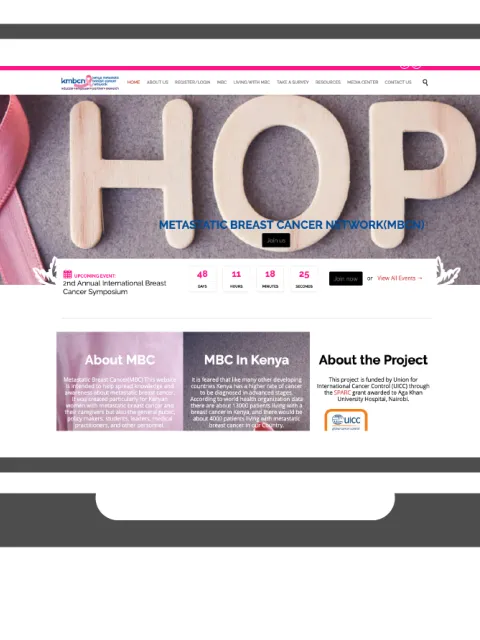Improving metastatic breast cancer care in Kenya using information technology

Context
In Kenya, recent data shows that breast cancer is the most common cancer among women of all ages and has the third highest mortality (both sexes, all ages).[1] Although limited data is available regarding metastatic breast cancer (MBC) (also called stage IV or advanced breast cancer) in Kenya, in 2014, it was found that 18.2% of women had MBC.[2] An MBC diagnosis can be isolating for patients and many encounter a lack of appropriate psychological and medical guidance.
The specific needs of MBC patients are often overlooked in many breast cancer related initiatives. Consequently, MBC patients feel marginalised and ignored by the wider breast cancer community. They often suffer from clinical depression and anxiety. Moreover, the majority of these women do not receive any services, referral or guidance to help them with their emotional distress. International resources are not always applicable to the local context, thus making them inaccessible and irrelevant for people from different cultures and backgrounds, such as those from Africa.

Kenya has a high percentage of literate females and highest internet usage in the region. This provides a unique opportunity to reach out to a significant population of MBC patients. For over fifty years, Aga Khan University Hospital, Nairobi (AKUH) has been taking care of families in East Africa. As a private, not-for-profit hospital, it strives to provide access to quality healthcare to all who need it and has the potential to reach cancer patients in the region. The vision of AKUH is to be a premier, tertiary, teaching, research and referral health care facility in sub-Saharan Africa.

Project description
AKUH has won a SPARC grant in 2017, with their project “Improving MBC care in Kenya using information technology”. The objective of this project is to improve the quality of life of women with MBC in Kenya through an online space that provides high quality content and information to patients, the general public, policy makers, students, leaders and medical practitioners.
Together with the Kenyan Metastatic Breast Cancer Network (KMBCN), AKUH has developed a virtual online forum where patients can get psychosocial support, address the stigmas linked with the disease, seek relevant clinical advice, find links to the nearest healthcare facilities, download curated information, participate in support group activities and receive links to other sites that are locally relevant. To make this forum accessible and user friendly for patients, a mobile app was also created.
KMBCN have started by identifying the needs and current quality of life through 150 patient interviews, which have served as a basis for designing the virtual space. Questionnaires have been integrated in the website for ongoing data collection/analysis. The finding of the needs assessment and quality of life assessment surveys conducted will be published in an international global health journal.
Impact
The online forum was launched in December 2018, and at the same time, more than 100 health professionals were trained on the use of the virtual space so that they can refer their patients to it.
It is estimated that the online forum as well as the mobile app will reach 75% of all MBC patients in the country. AKUH is now promoting the MBC online tools across the country and continuously evaluating their impact on patients' quality of life.
The project continues to support patients in Kenya and the team published a scientific article "Supporting Kenyan women with advanced breast cancer through a network and assessing their needs and quality of life" in 2021.
More
- Organisation's website: Aga Khan University Hospital, Nairobi (AKUH)
- Project website: Kenya metastatic breast cancer network
- News article: "Empowering Breast Cancer Patients", about the launch of the SPARC project
- Scientific article: "Supporting Kenyan women with advanced breast cancer through a network and assessing their needs and quality of life"
- Social media: Kenya metastatic breast cancer network Facebook page
References
[1] GLOBOCAN 2018
[2] Sayed, S., et al. "Is Breast Cancer from Sub Saharan Africa Truly Receptor Poor? Prevalence of Er/Pr/Her2 in Breast Cancer from Kenya." Breast 23.5 (2014): 591-6.
(Information from the project description and context is compiled from the SPARC reports)
Last update
Wednesday 27 March 2024